Page Contents
- What Is A Sale Deed
- Advantage Of Registered Sale Deed
- Information Provided On Sale Deed
- Procedure Of Property Sale Deed
- Important Points For Certified Sale Deed
- Sale Deed Format
- Registration Of Sale Deed
- How To Get A Sale Deed Copy Online
- Difference Between Sale Deed And Sale Agreement
- Cancellation Of The Sale Deed
- FAQs
What Is A Sale Deed
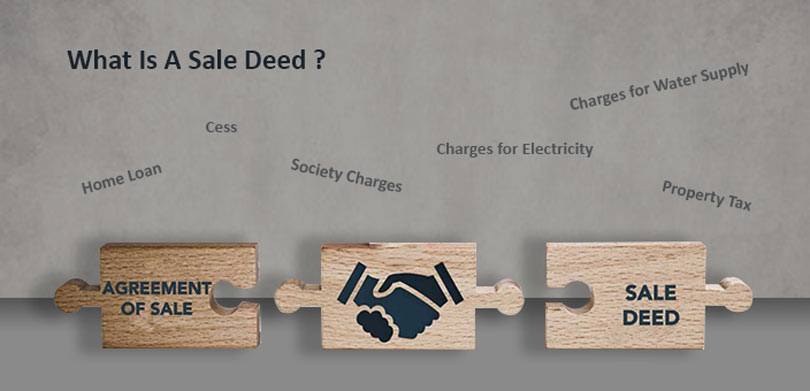
The sale deed is a legal document that exhibits the transfer of property ownership from the seller of the property to the buyer of the property. The purchase of any property between buyer and seller is legally incomplete without the sale deed.
This document is used as one of the important documents to prove the legal transaction between the transferor and transferee of ownership of the property.
It is signed by both parties on a mutual agreement with 4 witnesses from both sides at the sub-registrar’s office. Both parties must agree with all the terms and conditions stated in the sale deed.
The buyer needs to verify whether the property is free from the following obstructions:
- Cess
- Charges for electricity and water supply
- Society charges
- Property tax
- A home loan is taken for the property
- Any other tax
Advantage Of Registered Sale Deed
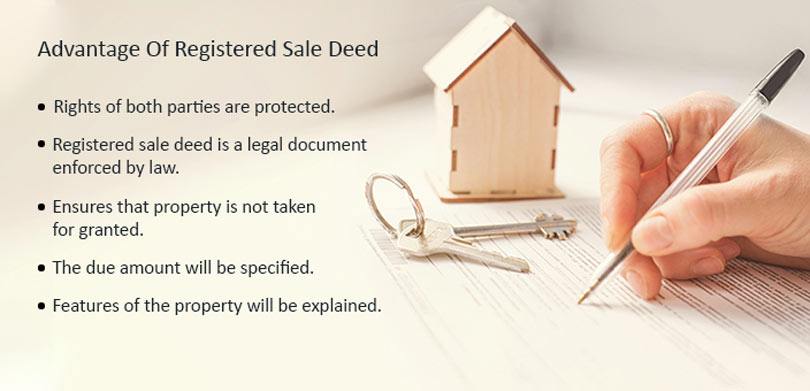 There are many advantages of a sale deed which is why it is important to register the sale deed. The advantages are listed in the following:
There are many advantages of a sale deed which is why it is important to register the sale deed. The advantages are listed in the following:
- The rights of both parties are protected through a registered sale deed. Registering the sales deed is also important as it helps in avoiding any future miscommunication or disagreement. A properly drafted sale deed will help to avoid legal risk.
- A registered sale deed is a legal document enforced by law and mutually agreed upon by both buyer and seller.
- It ensures the seller that their property is not taken for granted by the buyer. If there is any amount due, then it will be specified in the sale deed so that there is no misinterpretation.
- The features of the property will be explained in the sale deed which will help the buyer to receive a better description of the property.
Information Provided On Sale Deed

If you are entering into a transaction of buying or selling a property, then you need to sign a sale deed which will contain the following information:
- The address and the full name of the buyer and seller of that property
- The address of the property
- The size and structure of the property
- Free from any obstacles
- The details on which date to take over the property
- Payment details of the transaction
- Indemnity provision
Procedure Of Property Sale Deed
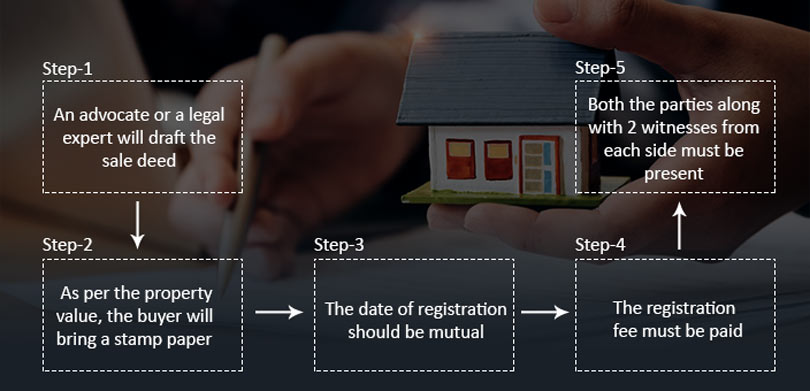
The property sale must be registered at the sub-registrar’s office during the time of transferring it to the buyer. However, you need to follow the below steps to register the property sale deed:
Step 1: An advocate or a legal expert will draft the sale deed
Step 2: As per the property value, the buyer will bring a stamp paper
Step 3: The date of registration should be mutual
Step 4: The registration fee must be paid
Step 5: Both parties along with 2 witnesses from each side must be present on the required date at sub registrar’s office
Certain documents are required for the registration process of the sale deed:
- Two passport-size photographs of both buyer and seller
- E-stamp paper along with the correct value of the stamp duty
- E-registration fee receipt
- Pan card photocopies of both the parties
- Original ID proofs of both the parties and their witnesses
- If the property costs more than Rs 50 lakhs then it is important to present the receipt of the TDS
- Keep the document ready which signifies the year in which the construction of the property was completed
- For confirmation, keep the document ready which ensures that the property does not belong to any government body
Important Points For Certified Sale Deed
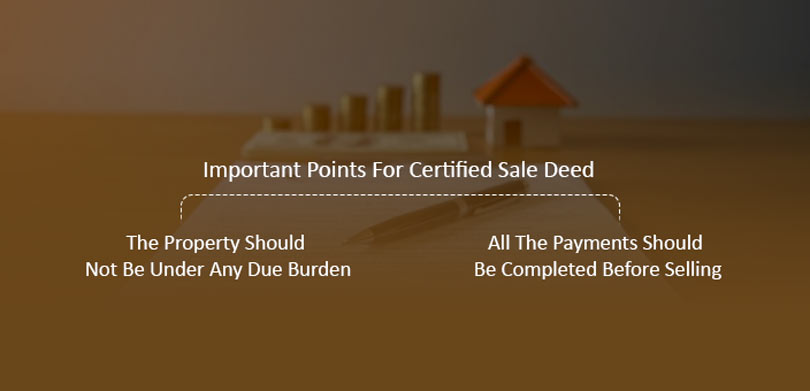
Before selling the property, there are a few points that are required to be ensured are explained in the following:
- The property should not be under any due burden: The seller and the buyer should ensure that the property should be free from any kind of obstacle or burden. The seller should pay off the loan (if any) on the property. It is the duty of the purchaser as well to verify whether there is any encumbrance on the property or not.
- All the payments should be completed before selling: It is the duty of the seller to pay off any due payments before proceeding with the sale deed. This includes paying for the water bill, electricity bill, etc.
Sale Deed Format
The format of the sale deed includes information that is important to complete the process of registration.
SALE DEED
This DEED OF ABSOLUTE SALE was executed at on this the day of , 201X
by s/o residing at
hereinafter called the VENDOR of the one part which expression shall include his executors, administrators, legal representatives, successors etc.
TO AND IN FAVOUR OF
w/o residing at
hereinafter called the PURCHASER of the Other Part which expression wherever the context so requires shall mean and include his heirs, executors, administrators, legal representatives, successors etc.
WHEREAS the VENDOR herein has purchased the said property more fully described in the Schedule hereunder from Thiru. in and by sale deed dated and registered on as Document No. of (year) of Book 1 volume No. filed at pages to on the file of the Sub Registrar of.
WHEREAS the VENDOR herein has been in exclusive possession and enjoyment of the
property more fully described in the Schedule hereunder with a constructed house thereon, which was constructed by him with his self-earned funds, till date.
WHEREAS the VENDOR is the exclusive owner of the property more fully described
in the schedule hereunder and he has absolute right to dispose of the same as in the manner he wishes;
AND WHEREAS the VENDOR is in need of funds in order to meet his personal
commitments and family expenses and has decided to sell the property more fully described in the Schedule hereunder for a sum of Rs /- (Rupees only) and the
PURCHASER herein has also agreed to purchase the same for the said price and to the effect they entered into an agreement to sell dated
NOW THIS DEED OF SALE WITNESSETH
THAT in pursuance of the aforesaid agreement and in consideration of a sum of Rs. (Rupees only) received by the VENDOR in cash and the receipt of the said entire consideration of Rs. (Rupees only), the VENDOR doth hereby admit, acknowledge, acquit, release and discharge the VENDOR from making further payment thereof and the VENDOR doth hereby sell, convey, transfer, and assigns unto and to the use of the PURCHASER, the property more fully described in the Schedule hereunder together with the waterways, easements, advantages and appurtenances, and all estate, rights, title and interest of the VENDOR to and upon the said property TO HAVE AND TO HOLD the said property hereby conveyed unto the PURCHASER absolutely and forever.
THE VENDOR DOTH HEREBY COVENANT WITH THE PURCHASER AS
FOLLOWS:
1. That the property more fully described in the Schedule hereunder shall be quietly and peacefully entered into and held and enjoyed by the PURCHASER without any interference, interruption, or disturbance from the VENDOR or any person claiming through or under him.
2. That the VENDOR has absolute right, title and full power to sell, convey and transfer unto the PURCHASER by way of absolute sale and that the VENDOR has not done anything or knowingly suffered anything whereby his right and power to sell and convey to the PURCHASER the property hereby conveyed.
3. That the property is not subjected to any encumbrances, mortgages, charges, lien,
attachments, claim, demand, acquisition proceedings by Government or any kind whatsoever and should thereby and the VENDOR shall discharge the same from and out of his own funds and keep the PURCHASER indemnified.
4. That the VENDOR hereby declares with the PURCHASER that the VENDOR has paid all the taxes, rates and other outgoings due to Local bodies, revenue, urban and other authorities in respect of the property more fully described in the Schedule hereunder up to the date of execution of this sale deed and the PURCHASER shall bear and pay the same hereafter. If any arrears are found due to the earlier period, the same shall be discharged by the VENDOR.
5. That the VENDOR has handed over the vacant possession of the property more fully
described in the Schedule hereunder to the PURCHASER on and delivered the
connected original title document in respect of the schedule mentioned property hereby conveyed on the date of execution of these presents.
6. That the VENDOR will at all times and at the cost of the PURCHASER execute, register or cause to be done, all such acts and deeds for perfecting the title to the PURCHASER in the property hereby sold and conveyed herein.
7. That the VENDOR do hereby covenant and assures that the PURCHASER is entitled to have mutation of his name in all public records, and local bodies and also obtain patta in the name of the PURCHASER and undertakes to execute any deed in this respect.
SCHEDULE OF PROPERTY
The Market Value of the Property is Rs.
In witness where of the VENDOR and the PURCHASER have set their signatures on
the day month and year first above written.
Witnesses:
VENDOR
1)
2)
THE PURCHASER
Drafted by:
Registration Of Sale Deed
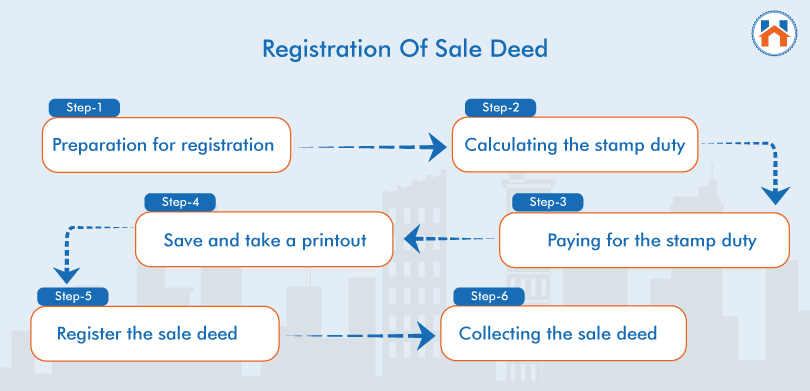 A registered sale deed is only eligible to be enforced by the law legally. Hence, it is important to get the sale deed registered by the sub-registrar.
A registered sale deed is only eligible to be enforced by the law legally. Hence, it is important to get the sale deed registered by the sub-registrar.
The process of registering the sale deed is explained in the below steps:
Step 1: Preparation for registration – You should pay the full consideration amount according to the agreement and also ensure that there are no arrears due on the property before the process of sale deed registration.
Step 2: Calculating the stamp duty – The stamp duty will be imposed according to the market rate or current value, whichever is higher. Apart from the stamp duty, you will also pay 1% as the registration charge.
Step 3: Paying for the stamp duty – This method is called E-stamping where the parties have to visit the website of Stock Holding Corporation of India and select the online payment option. You can also pay the stamp duty through your nearest SHCIL or Bank Authorized Collection Center.
After you submit the stamp duty online, you will have to take the printout for Online Reference Acknowledgment no. to the Stock Holding Branch to collect the e-stamp certificate. Each stamp paper has a different acknowledgment no. which is useful for future use.
During the process of submission, both parties will have to provide their fingerprints on the stamp paper. Along with the ID proofs, the property receipt and TDS will have to be submitted.
Step 4: Save and take a printout – The sale deed must contain the buyer and seller’s details along with the sale’s terms and conditions. In the case of e-stamp paper, you need to attach the sale deed along with the e-stamp paper.
Step 5: Register the sale deed – You have to register the deed in front of a sub-registrar. The buyer and the seller will sign in front of the sub-registrar.
Step 6: Collecting the sale deed – After signing the sale deed in the registrar’s office, you have to collect a token slip from the office. This will be used for future reference for collecting the original copy of the registered sale deed.
You can collect the original sale deed within 15-20 working days after the registration process was done. If taking a loan, then the bank will collect the original copy on your behalf of you.
How To Get A Sale Deed Copy Online
You can not get a sale deed copy online. To register the sale deed, you will have to visit the registrar’s office and get it legally authorized by the sub-registrar.
Difference Between Sale Deed And Sale Agreement
The sale agreement or agreement to sale differs from the sale deed because here it is agreed to buy or sell the property in the future. Whereas, the sale deed is a legally enforced written agreement of transferring the property from seller to buyer.
| Sale Agreement | Sale Deed | |
| Meaning | Mutually agreeing to buy/sell a property in the future. However, the buyer does not have a right or interest in the property because it is not enforced by law. | A legal document that exhibits the transfer of property ownership from the seller of the property to the buyer of the property through legal documentation. |
| Transfer of ownership | There is no transfer of ownership under the sale agreement | There is a full transfer of ownership under the sale deed |
| Registration | There is no registration process in the sale agreement. | It is mandatory to register the sale deed for legal process |
| Complaint | The party can suit damages under the sale agreement | The party can legally complain about another party and demand monetary compensation |
| Risk | The seller has to bear the risk of the property until the ownership is transferred | The buyer has to bear the risk of the property as ownership is immediately transferred |
Cancellation Of The Sale Deed

Cancelling the sale deed will terminate the ownership and right of the buyer over the property. The property transfer also gets canceled which took place between the buyer and the seller. However, it is important that the agreement of cancellation must be signed by both parties.
As per Sections 31, 32, and 33 of the Specific Relief Act, the cancellation of the sale deed is possible under certain conditions like
- If the buyer thinks that the sale deed is revocable then they can cancel the sale deed.
- On the mutual decision of canceling the sale deed of buyer and seller
- The sale deed was created under the prescription of the Indian Registration Act. 1908.
FAQs
| Q1: How to write a sale deed format?
Ans: The sale deed format can be written with the details like name and address of both the parties. the size and structure of the property, free from any obstacles, the details on which date to take over the property, payment details of the transaction, and the Indemnity provision. |
| Q2: Who will keep the sale deed of the property?
Ans: The Sale deed verifies the ownership of the property, hence, should remain with the owner. The buyer of the property will keep the sale deed of the property. |
| Q3: Who will pay for the sale deed?
Ans: The buyer will pay for the amount incurred during the process of the sale deed. |
| Q4: Who can claim the cancellation of the sale deed?
Ans: Both the parties who were present for the agreement of the sale deed can claim for the cancellation of the sale deed. The person who perceived that the document is void or revocable can claim. |








